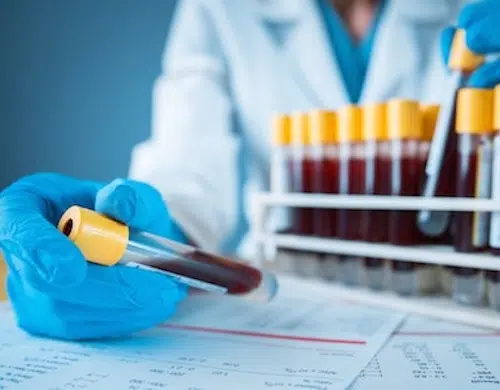
Blood Testing for Allergies
Blood tests can tell if someone has allergies by finding antibodies in the blood that react to allergens.
learn moreAn estimated 20 million people in the US have food allergies. Source: AAFA
A food allergy, also known as food hypersensitivity, occurs when the body’s immune system incorrectly identifies a harmless food protein as a threat and reacts against it. This reaction can manifest quickly or within a few hours after ingestion, leading to symptoms ranging from mild discomfort to severe, life-threatening conditions. Food allergies are notably prevalent among children, with peanuts being one of the most common triggers. Recent research suggests that food allergies are on the rise, possibly due to changes in dietary habits and environmental exposures. Understanding and managing food allergies is crucial for the well-being of those affected.
All food allergy reaction symptoms should be taken seriously, and an allergist should be consulted when suspected. However, some reactions can be uncomfortable, and others can be life-threatening.
In some cases, food allergies can result in symptoms that are much more severe, even fatal. Rapid onset of these can be signs of anaphylaxis and require immediate medical treatment. Patients who develop any of the following symptoms should seek medical help immediately.
What Causes Food Allergies?
Food allergies occur when the immune system mistakenly identifies a specific food protein as harmful, triggering an allergic reaction. This immune response can range from mild to severe and may involve various organs in the body. The exact reasons why some people develop food allergies while others do not remain unknown.
The question is often asked: Are food allergies genetic? There can be a genetic disposition, but frequently, it’s because families share the same environmental factors. Specific food allergies are not genetic. Source

It’s crucial to understand that an allergic reaction may not always occur immediately after consuming food. This is especially important to recognize in children who may not be aware that they are experiencing a reaction. Delayed allergic responses can be deceptive, leading individuals to underestimate the severity of their condition.
Experts stress the importance of being vigilant for any signs of an allergic reaction, no matter how mild, and recommend using an epinephrine auto-injector at the first sign of trouble. Given the unpredictability of how rapidly a mild reaction can escalate into a life-threatening situation, this precautionary measure could be lifesaving, especially when dealing with children who might not recognize or communicate their symptoms effectively.

When should you see a doctor vs when to go to the Emergency department? Unclear reactions require professional insight—if there is a repetitive pattern of mild symptoms, schedule an appointment with an allergist.
Call 911 or go to the nearest emergency department in cases of severe reactions or anaphylaxis.
Risk factors can vary from person to person and allergy to allergy. Below are the general rule of thumb for the increased risk of having a food allergy or developing another one:
Family history of food allergies
We know that genetic factors can play a role and increase the chance of the individual having food allergies.
Existing food allergy
This can be a good sign to do a full allergy testing panel to learn if you have more allergies.
Environmental allergy
Additional exposure to environmental allergens can contribute to a food allergy.
Childhood eczema
Children with moderate to severe eczema have a greater risk of food allergies.

There are some common foods that trigger the majority of food allergies. Common food allergy triggers include:
Some who think they have a food allergy may instead have what is known as a food intolerance.
While these two conditions share many symptoms, it is important to understand that a food allergy triggers an immune response and can, therefore, be fatal in some cases. A food intolerance causes digestive issues and discomfort, typically, and are less serious. This is the main and most important difference between food allergy and food intolerance.
When one has a food intolerance, you may be able to consume small amounts of the food and only experience symptoms when you consume large amounts.
Food intolerance can be caused by several different triggers, including:
Some patients may have an aversion to certain foods due to stress or psychological factors, as well.
Gluten is probably the best-known trigger of food sensitivities, but the best tool for identifying food sensitivities is careful observation and experimentation. A physician or nutritionist can provide guidance for undertaking an elimination diet, help you understand limitations, and avoid possible pitfalls.
According to Harvard Health, food sensitivity is when certain foods create an immune reaction that generates various symptoms. These symptoms are not life-threatening but may include:

It’s important to recognize that not all adverse reactions to food are due to allergies. Several conditions can mimic the symptoms of food allergies, making diagnosis a careful process.
For instance, the absence of an enzyme required for digesting certain foods can lead to symptoms similar to those of food allergies. Food poisoning, often resulting from contaminated food, can also mirror allergic reactions, as can sensitivity to food additives present in many processed foods.
Additionally, Celiac disease, an autoimmune disorder triggered by gluten, can cause reactions that closely resemble those of food allergies. Understanding these conditions is crucial for accurate diagnosis and treatment.

Blood Testing for Allergies
Blood tests can tell if someone has allergies by finding antibodies in the blood that react to allergens.
learn more
Skin Allergy Testing
This is less invasive than blood tests and is a good alternative for patients who don’t like needles.
learn more
Food Allergy Testing
A challenge test is a highly accurate diagnostic test to determine if a patient has outgrown a food allergy.
learn moreCurrently, there’s no cure for food allergies, but several treatments can help manage the symptoms. The recommended treatment varies depending on the severity and type of allergy, so it’s essential to consult with a healthcare professional to determine the best approach for each individual case.
Medications
Benadryl, along with other medications like Zyrtec and Claritin, can be effective in managing the symptoms of food allergies. These antihistamines work by counteracting the body’s histamine response to allergens, helping to alleviate reactions such as itching, swelling, and hives. When taken as directed, they can provide significant relief from food allergy symptoms, making them a valuable part of managing allergic reactions.
Immunotherapy
Allergy immunotherapy makes you less sensitive to the things that trigger allergies and allergic asthma. Ongoing research is exploring immunotherapy as a treatment option for food allergies. Still, it’s an ideal choice for patients with severe allergies who are unable to avoid exposure to an allergen.
Epinephrine Auto-Injector
When faced with a food allergy that can cause an anaphylactic response, it is essential to carry an Epinephrine auto-injector with you. Quick administration increases the chance of survival during anaphylactic episodes. To learn how to use one, visit our step-by-step blog.
There is no known cure for food allergies; however, patients can take steps to manage their condition. In some cases, treatment options may be available to help lower the risk of a reaction. Talk with your allergist today about the right plan for your condition.
.
Prevention & Avoidance
The American Academy of Pediatrics and allergists encourage introducing the 8 most common food allergens into a baby’s diet before 11 months of age. This can help prevent the development of allergies to those foods.
Those who have known allergies should avoid any and all exposure to food allergy triggers. Several different habits form in everyday life.
Mild Reactions
Reactions can vary but the most common are skin reactions, oral itching, mild abdominal pain. Any food allergy reaction or intervention should be pursued by a consultation with a medical professional.
Severe Reactions
Any person who has a severe food allergy should create and maintain an allergy action plan in partnership with their doctor. This includes carrying and knowing how to use an epinephrine autoinjector.
Consulting with an allergist is crucial to diagnosing a food allergy. The allergist may recommend undergoing specific diagnostic tests, such as allergy skin or blood tests, to identify the allergens with high precision. Additionally, be prepared for likely questions about your medical history, symptoms, and dietary habits to accurately determine the cause of your allergic reactions. This comprehensive approach ensures a correct diagnosis, guiding you to improved health and wellness.
Your allergist may order one or several tests to get a complete picture of your condition(s); standard diagnostics are: